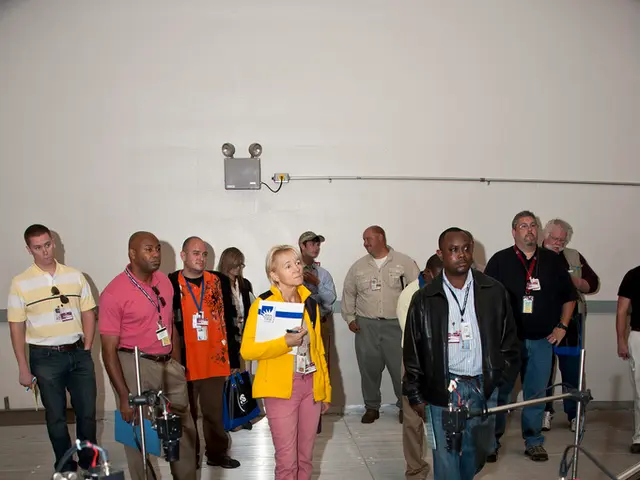Vietnam views Japan as a trusted collaborator in the new era: Deputy Prime Minister
Tokyo – Vietnam regards Japan as a trusted partner in its journey towards development, Deputy Prime Minister Nguyen Chi Duong stated during a meeting with Japanese Prime Minister Ishiba Shigeru in Tokyo on Friday.
The meeting occurred as part of Duong's visit to the city for the 30th Nikkei Forum, "Future of Asia." Duong underlined his satisfaction with the robust development of the Vietnam-Japan Comprehensive Strategic Partnership, built upon mutual trust and political commitment.
Duong expressed a desire for increased collaboration and effective realization of high-level agreements to strengthen the relationship further. He also stressed the importance of close coordination in boosting political trust and solidifying the bond between the two countries.
Outlining Vietnam's ambitions, Duong proposed deeper economic, investment, cultural, educational, and locality-to-locality ties, particularly encouraging Japanese investment in significant projects in Vietnam, namely urban and high-speed railways, energy, digital infrastructure, high-quality agriculture, and the semiconductor sector.
Regarding technological cooperation, Duong emphasized that Vietnam aims for stronger ties, focusing on green transition, digital transformation, and high-quality workforce training, especially in the semiconductor sector. He also suggested Japanese support for improving the efficiency of the Nghi Son refinery and petrochemical project in the central province of Thanh Hoa.
Prime Minister Ishiba, reflecting on his April visit to Vietnam, praised the country's development vision and the energy of its people. He expressed confidence in Vietnam's ability to achieve its development goals while reaffirming Japan's dedication to advancing bilateral agreements in trade, economy, investment, science, technology, and human resource development.
Ishiba endorsed the emphasis on science, technology, innovation, and workforce training, lauding the contributions of Vietnamese workers in Japan. He expressed enthusiasm for welcoming more workers, particularly those with specialized skills.
On global and regional issues of shared concern, both leaders agreed to work together at multilateral forums, address global challenges, and intensify multilateral free trade.
At a roundtable meeting with the Japan Business Federation (Keidanren), Duong urged Japanese associations and businesses to partner with the Vietnamese Government in tackling economic challenges with a new vision, creating strong "steel punches" for the economy, and generating practical benefits for both nations.
Duong welcomed the constructive feedback from Keidanren representatives and pledged to direct Vietnamese ministries, agencies, and localities to urgently address any issues and facilitate new, effective projects.
"Let's restructure supply chains to leverage our complementary strengths, reducing exposure to external risks," Duong said, noting that 2025 is a pivotal year for Vietnam to achieve its 2021-2025 development goals through acceleration and breakthroughs.
The Vietnamese Government is currently refining its institutional framework, improving the business environment, and removing bottlenecks to unlock resources, Duong added. The Government has prioritized administrative reform, streamlined procedures, and decentralization to position Vietnam as Southeast Asia's best investment destination.
Later the same day, Duong met with President and Chief Executive Officer of Sumitomo Corporation Shingo Ueno. Duong was updated on the corporation's projects in Vietnam and their implementation progress. Ueno highlighted Sumitomo's commitment to continuous expansion in line with Vietnam's net-zero emission commitments.
Duong praised Sumitomo's substantial contributions to Vietnam's socio-economic development through large-scale and substantive projects. He particularly recognized the corporation's success in asserting its brand in Vietnam, particularly in the industrial zone sector, where its hi-tech, high-value projects align with Vietnam's priorities.
He stressed the importance of land and energy efficiency, especially for industrial parks around Hanoi. Regarding the smart urban development project in the North of the capital city, Duong endorsed Sumitomo's investment approach towards creating a smart city with enhanced healthcare and education infrastructure.
The Ministry of Industry and Trade is currently reviewing Sumitomo's proposal for the Vãn Phong 2 LNG power plant project and will provide feedback soon, according to the Deputy PM.
Besides, Duong requested Sumitomo to continue working closely with relevant Vietnamese agencies to expedite the launching of the LOTUSat-1 satellite, an initiative agreed upon during Japanese Prime Minister Ishiba Shigeru's official visit to Vietnam last month.
In his speech at the Việt Nam Digital Transformation Day 2025 in Tokyo, Duong emphasized that Vietnam views science, technology, innovation, and digital transformation as the keys to overcoming the middle-income trap and avoiding the risk of falling behind, while realizing the country's aspirations for prosperity.
Vietnam currently boasts over 70 companies and 5,000 IT engineers actively operating in Japan, contributing to the host country's technology ecosystem and innovation development. Both countries established cooperative ties in science, technology, innovation, and high-quality human resources training as new pillars of their Comprehensive Strategic Partnership during PM Ishiba's visit to Vietnam in April.
Duong highlighted Vietnam's dynamic economy with over 100 million people, a high-quality IT engineering workforce, over 1 million workers in the information and communications sector, and tens of thousands of technology graduates annually. Meanwhile, Japan excels in AI, robotics, semiconductors, and green technologies. Japanese companies not only bring cutting-edge innovation but also strategic management expertise in applying technologies to address global challenges.
The Deputy PM suggested increased collaboration in research and development, transfer of strategic and core technologies. Vietnam seeks to learn from Japan's experience in AI, big data, cyber security, semiconductor technology, cloud computing, and 5G/6G technologies while promoting digital human resources training.
Deputy Prime Minister Nguyễn Chí Dũng (left) meets Japanese PM Ishiba Shigeru in Tokyo. - VNA/VNS Photo Phạm Tuân
On Saturday, Duong is scheduled to meet with the Governor of Gunma prefecture, visit the Tsukuba Space Centre, and have a working session with Vietnamese scientists in Japan.
- Deputy Prime Minister Nguyen Chi Duong, during his visit to Tokyo for the 30th Nikkei Forum, emphasized the importance of close cooperation with Japan in boosting political trust and solidifying the bond between the two countries.
- Duong expressed a desire for increased collaboration in economic, investment, cultural, educational, and locality-to-locality ties, particularly in areas such as urban and high-speed railways, energy, digital infrastructure, high-quality agriculture, and the semiconductor sector.
- Prime Minister Ishiba praised Vietnam's development vision and the energy of its people, expressing confidence in Vietnam's ability to achieve its development goals.
- Ishiba endorsed the emphasis on science, technology, innovation, and workforce training, lauding the contributions of Vietnamese workers in Japan.
- Duong urged Japanese associations and businesses to partner with the Vietnamese Government in tackling economic challenges and creating strong "steel punches" for the economy.
- On global and regional issues of shared concern, both leaders agreed to work together at multilateral forums, address global challenges, and intensify multilateral free trade.
- The Vietnamese Government is currently refining its institutional framework, improving the business environment, and removing bottlenecks to unlock resources.
- The Ministry of Industry and Trade is currently reviewing Sumitomo's proposal for the Vãn Phong 2 LNG power plant project and will provide feedback soon.
- Vietnam boasts over 70 companies and 5,000 IT engineers actively operating in Japan, contributing to the host country's technology ecosystem and innovation development.
- Duong suggested increased collaboration in research and development, transfer of strategic and core technologies, and digital human resources training.
- Vietnam seeks to learn from Japan's experience in AI, robotics, semiconductors, and green technologies to promote digital human resources training.
- On Saturday, Duong is scheduled to meet with the Governor of Gunma prefecture, visit the Tsukuba Space Centre, and have a working session with Vietnamese scientists in Japan.








